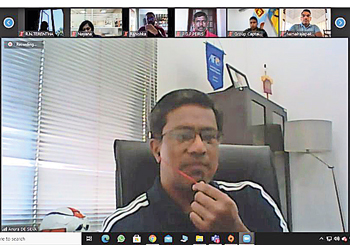Super League to lay foundation for professionalising sport

A pro football league - a need of the hour
The Super League, planned by the Football Federation of Sri Lanka (FFSL), is expected to lay the base to a futuristic assurance of making the most globally followed sport more prominent, said its president Anura de Silva.
Though the Super League promises a brighter and secure future to the local footballers, who are mostly amateurs, some clubs are facing teething issues with the current socio-economic background.
However, FFSL is willing to take the risk as de Silva explained, and see the Super League take off to address the issues that may arise or do ‘running repairs’.
“Whatever obstacles and problems that may experience, we have to start from somewhere. Without giving it a go, you cannot simply presume its pros and cons. Our interest is about bringing professionalism into football, and then build up a strong competition,” de Silva explained.
Originally scheduled to kick off in April 2020, the Super League was later moved to November 2020, subject to health authorities’ clearance, but the FFSL had to take another pause before finally putting out the approved blueprint.
February 17 will be the commencement of the country’s first professional league’s pre-season matches which is expected to end by March 10. The Super League 2021 will have its official inauguration on April 17 and will come to an end by July 30, during which period two breaks will be taken to release national players for the FIFA World Cup Qatar 2022 Asian Qualifiers second round matches.
The tournament, which has the patronage from FIFA, will feature 10 clubs through FFSL’s Club Licensing Criteria in association with the Asian Football Confederation (AFC). The clubs set to feature in the inaugural pro-league will include Defenders of Army, Sea Hawks of Navy, Blue Eagles of Air Force, Colombo FC, Renown SC, Ratnam SC, Red Star SC, Blue Star SC, Upcountry Lions SC and New Youngs FC. With three of the 10 clubs being from the national security forces, apart from a few organised clubs, some are facing financial issues with the restrictions created by the pandemic.

The Zoom Meeting in progress
“The clubs, as always, have the liberty to find sponsors. The FFSL understands the financial issues some clubs are facing currently with the situation. Sponsors are hard to convince nowadays. But we certainly can provide support through the FIFA Funding Assistance Programme. We know the start will be a bit tough, but our intention is to gradually build up the professional competition in Sri Lanka. We have proposed a minimum (salary) base for players and clubs must comply to those guidelines,” added the former Sri Lanka football skipper.
As a final phase of the exercise the FFSL conducted a zoom meeting in which the Minister of Sports Namal Rajapaksa, Dr Lal Ekanayake, the Director General of the Institute of Sports Medicine of the Sports Ministry and FFSL officials were participants.
“Minister Rajapaksa extended his fullest support and assistance to develop football in Sri Lanka and elaborated the importance of elevating the game to a professional level if we are to achieve international recognition and achievements to gain a better FIFA ranking in the game. He also stated that his vision is to establish another professional tournament, which will conducted on a city-based franchise system so that more players would have the opportunity to play elite level football while developing a strong brand image for the game at the regional level around the island,” FFSL stated in an official communiqué, terming the meeting a success.
For a start, the Super League will include 10 teams, but de Silva explained that it will not have a relegation system until the second season. Towards building up a professional league, the upcoming competition will get underway as semi-professional and by the second season FFSL expects to rectify all shortcomings before making the tournament fully professional.
“Through this our intention is to make the Super League beneficial to all — players, clubs, sponsors and the organisers. By the second season we expect all these aspects to link and in return create a smoothly running professional league. We know all will not be perfect as expected at the start, but we certainly can lay the base to a strong structure,” said de Silva.
The FFSL will open the Super League’s first player registration window from January 25 until February 28 and the second window is expected to run from July 15 to August 15 for all clubs to register players both on-loan and on transfer.
With the current COVID-19 situation health and safety coming as top priority, FFSL will adhere to all health regulations stipulated by the authorities during the pre-season training games and will incur the extra burden and cost related to these health guidelines. All players and officials involved with the Super League will be subjected to PCR tests.



